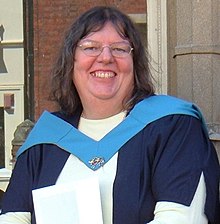Angela Clayton
Angela Helen Clayton | |
|---|---|
 Angela Clayton in 2009 | |
| Born | 1959 |
| Died | 8 January 2014 (aged 54–55) Reading, Berkshire, England |
| Occupation | Physicist |
Angela Helen Clayton MBE (1959 – 8 January 2014[1]) was an internationally known physicist working in the fields of Nuclear Criticality Safety and Health Physics. She was also a campaigner for the rights of transgender people.
Professional career[edit]
Her professional accomplishments included:
- Head of Criticality Safety at the Atomic Weapons Establishment for some years;
- Chairperson of the UK Working Party on Criticality;
- Member of the Working Group for American National Standard 8.15 - Nuclear Criticality Control of Special Actinide Elements[2] coordinated by the American Nuclear Society;
- Participant in the International Criticality Safety Benchmark Evaluation Project;
- Member of Advisory Programme Committees and Technical Programme Committees for several International Conferences on Nuclear Criticality Safety (e.g. International Conference on Nuclear Criticality Safety (ICNC) 1991 - UK, ICNC 2003 - Japan, ICNC 2007 - Russia[3]);
- Authored or co-authored several published papers on various aspects of criticality safety.
She held various roles in Safety Committees and the Reactor Safety Panel at the Atomic Weapons Establishment (now AWE, plc). She was interested in the subjects of criticality safety and Radiological Protection - Health Physics.
Clayton was also active in national and local Prospect trade union activities, including serving on the pension National Executive Committee (NEC) Advisory Sub Committee[4] and was an elected trustee of the AWE Pension Scheme from 1 February 2009 - 1 February 2011.[5][6][7]
After her early retirement in March 2011 on medical grounds due to complications from an old automobile accident in 1996, she pursued various artistic and intellectual activities including acquiring a large telescope with which she could engage in a lifelong love of astronomy.[citation needed]
Her most recent degree was in Law from the Open University. She graduated with a first in April 2009.[citation needed]
Personal life[edit]
Her early interactions with medical practitioners were described as traumatic, leading her to transition without medical support. After living several years as a woman, she reengaged with medical practitioners to obtain surgery.[8]
She worked as a campaigner with Press for Change beginning in 1999 and later served as their vice-president. Her interest in the role of trade unions in promoting equality for trans people led her to become the first “trans observer” to the UK Trades Union Congress (TUC) LGBT Committee. She was also involved in the development and implementation of the Gender Recognition Act 2004.[8]
She was appointed a Member of the Order of the British Empire (MBE) in June 2005 "for services to gender issues".[9] Clayton was a speaker at the Greater London LGBT Organising Day in February 2008.[10] She contributed to the "Trans Data Position Paper" for the National Statistics: UK Statistics Authority in 2009.[11]
References[edit]
- ^ Legacy.com. Archived at [1]
- ^ Page 22, American Nuclear Society, Standards Committee Report of Activities, 2008
- ^ Criticality Mass Calculations for AM-241, Am-242m and Am243
- ^ Page 47, Prospect Annual Report, 2009
- ^ The AWE Pension, Pensions Update, 2008
- ^ The AWE Pension, Pensions Update, 2009
- ^ AWE Pension Trustees Limited
- ^ a b Angela Clayton - PFC campaigner | Press For Change Archived September 27, 2007, at the Wayback Machine
- ^ "QUEENS BIRTHDAY HONOURS - ORDER OF THE BRITISH EMPIRE, CIVIL ORDER OF THE BRITISH EMPIRE". Government News. 11 June 2005. Archived from the original on 16 January 2016. Retrieved 3 September 2012.
- ^ "Greater London LGBT Organising Day". Lesbian, gay, bisexual and transgender members. Unison. Archived from the original on 24 December 2012. Retrieved 3 September 2012.
- ^ Thomas, Jennifer (May 2009). "Trans Data Position Paper" (PDF). Office for National Statistics: UK Statistics Authority. Retrieved 3 September 2012.
Further reading[edit]
- "Obituary – Angela Clayton MBE". LGBT History Month. Archived from the original on 22 March 2019. Retrieved 22 March 2019.
